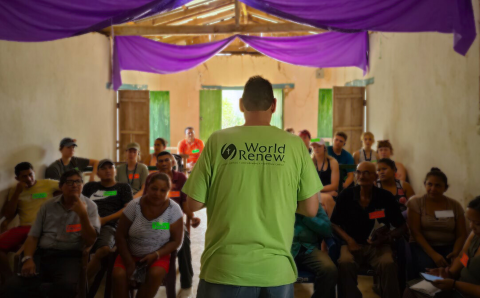In June, I attended a presentation by Colin Watson, the former executive director of the Christian Reformed Church in North America and the first graduate of the D.Min. program at Calvin Theological Seminary. His presentation, part of the Theory and Practice: Doctorate of Ministry discussion series, shared key findings from his dissertation, “Leading in White Spaces: The Experience of African American Pastors as Leaders in the CRCNA.” Family and friends, community leaders, pastors and congregants, current and prospective seminarians, faculty, and staff filled the auditorium for a panel discussion and audience questions.
When Watson mentioned that the Rev. Eugene Callender was the first ordained African American pastor in the CRC, I remembered meeting Callender in New York with a delegation of inner-city CRC pastors in 2001. It was a privilege and an eye-opening experience. With the help of the Spirit, Callender built a vibrant inner-city ministry in the Harlem neighborhood of New York City in 1952. Like the nine African American participants in Watson’s research, Callender said he was called to serve in the CRC. I also was called to the CRC, and I understand how God’s calling has played a crucial role in my ministry.
I had a lot to process on my drive home from the seminary event. I recalled panelist Danjuma Gibson, professor of pastoral theology, care, and counseling at CTS, encouraging us to tell our stories. I had become selective about telling my story because I longed for change in the CRC and it wasn't happening quickly enough. I understand the difficulty, slow pace, and painfulness of change in many cases, but it can become frustrating when we miss our stated vision and goals.
Yet I kept the course, partly because God gave me a vision of a church with diverse kinds of people several times before God called me to go to seminary. Since then, I have had that same vision many times. It has never faded. Remembering this vision and having the encouragement of spiritual companions energize me to press on and finish well. Sometimes I’ve wanted to give up, but I thank God for his grace and strength in my 25 years of service in the local church, denominational offices, and now the seminary. I am encouraged and hopeful for God’s will to be done in the church. One of my greatest joys is to help develop and influence the next generation of church leaders, in the CRC and beyond.
God is not finished with me yet. I’m arriving at a new place in my spiritual journey from which to examine and redeem my African American roots and culture. I continue to wrestle with what it means to be Black and Reformed. How do I faithfully serve in the Christian Reformed Church and fully embrace who I am as God’s beloved daughter, made in God’s image? What needs to be redeemed that I had consciously or unconsciously given up? I will tell my story again, but it will be a story of transformation.
Listening to Watson’s presentation that evening, I could hardly contain my emotions. I could have shouted. That happens sometimes in the churches of my Baptist heritage when the preacher is speaking the truth. The shouts say we agree. I thought about those individuals involved in racial reconciliation in the CRC for many years, some of whom were in the room and some who were not. I pray for wisdom and strength for them and those who are beginning this journey of racial reconciliation. You are not alone. May we continue the conversation leading to action with the help of the Holy Spirit.
About the Author
Denise L. Posie, M.Div., has served in the ministry of discipleship in redemptive kingdom diversity at Calvin Theological Seminary since 2020. Her upcoming memoir is Called to Remember: Soul Care Through Spiritual Encounters.









